Strip away the dazzling lights, pounding music and enthralled crowds that have enjoyed the Australian Swimming Trials at the Brisbane Aquatic Centre and you’re left with something pretty stark. The very real emotions that leave tears welling in the corners of eyes, or leave you overcome with raking sobs that consume and convulse the unwary in hidden corners of the pool.Stories of personal tragedy. Personal pain. And personal glory. The Australian Swimming Championships concluded on Saturday night with a microcosm of the joy and despair that has played out over a thrilling week in Brisbane’s south-east. Cate Campbell. Australian swimming royalty. Arguably the greatest relay swimmer in history. She couldn’t complete her own fairytale finale, falling short in a super-competitive women’s 50m freestyle final. “I had hoped for the fairytale ending,” Campbell said through tears. “It’s what I had worked for and what I felt I was capable of. And unfortunately, my body just said no.” But the outpouring of love and affection she received from her fellow competitors surely balanced out the disappointment. All seven women swam to Campbell, paying homage to the swimmer she was and the inspiration she remains. Campbell finished in seventh spot, with Shayna Jack first ahead of Meg Harris, who earned a spot in her first ever individual event at an Olympics, having already won two medals in relay events in Tokyo. The gap between Harris in second and Mollie O’Callaghan in sixth was just 0.23 seconds. Campbell, whose international career started as a 16-year-old in Beijing, where she won two bronze medals, bows out as one of Australia’s greatest. “Her contribution is immense,” Australian head coach Rohan Taylor said. “Cate has been obviously one of the best relay swimmers in the world consistently over time. “You can’t deny that her presence on the team, her leadership, her poise, who she is as a person is probably the the key thing, and her legacy in swimming is undeniable.” A star of a different kind also fell short in his own Hollywood-esque bid to compete at an Olympic Games. Cody Simpson’s journey from pop star to sports star was a tale of storybook quality. The 27-year-old put his music career on hold to put himself through the gruelling, thankless task of rekindling his childhood swimming career — opening himself up to the prospect of embarrassment and ridicule. That he successfully made an Australian swimming team at the 2022 Commonwealth Games was stunning enough. A bid to compete at the holy grail of sport was always going to be tough, and proved to be one step too far for even those who have written his scarcely-believable script. “I’ve come a lot further in the last four years than I perhaps could have bargained for, starting from zero,” Simpson said. “Just to do right by that kid in me that gave it up to go and pursue something else. “To swim for Australia is just something that not a lot of swimmers get to achieve or get to experience. “I feel really proud to see how far I could go. and satisfy the fire that was inside me to compete and swim again. “It’s just helped me grow so much, and I can’t wait to take that back into music and entertainment and see what I can do.” There was joy as well. Aside from 50m qualifiers Shayna Jack and first-time individual event swimmer Meg Harris, Matthew Temple made the qualifying time in the 100 fly, and Australia will welcome another Olympic debutant to the squad. Jenna Forrester, who had missed out on qualification in the 200 medley, 200 free and 200 back earlier this week, made amends in the 400 individual medley (400IM). ABC Sport “This week has really just been setting up for tonight for the 400IM,” Forrester said after her heat. “I feel like I’ve done some solid racing this week and yeah, happy with how it’s going.” In the men’s 400IM, both Brendon Smith and William Petric achieved the qualifying time to book their spots on the plane to Paris. Lani Palister and marathon swimmer Moesha Johnson both made the qualifying time in the 1,500m to conclude the evening’s racing. Johnson will add the 1,500m in the pool to the 10km marathon swim in the River Seine. “You know, I considered not doing this,” Johnson said. “I considered just focusing on the 10K, but to be [in] the pool is something so special, and I missed Tokyo. Throughout the week, Australia’s swimmers have underlined just how strong a squad they will take to Paris, where they will hope to build on the nine gold medals they won in the eerie silence of the COVID-cocooned Tokyo Aquatics Centre. Amidst the wild roaring of energised and engaged crowds in Brisbane, Australia’s best proved that they were also the world’s benchmark setters. On days one through four, spectators were treated to some of the fastest swimming in history. Kaylee McKeown put the fear of God into the world record in three different events across three days. Ariarne Titmus came within a whisker of cracking her own 400m freestyle mark on the very first night of the competition, and then claimed the 200m record in devastating fashion from her own clubmate Mollie O’Callaghan who, incidentally, also ducked under her own previous mark. Such is Australia’s extraordinary strength that Emma McKeon, the most decorated athlete at the 2020 Games in Tokyo, will be swimming in one individual event just three years later. “Definitely wasn’t what I wanted, but that’s sport,” McKeon said. “You don’t always get the result that you want, and I think it’s just as important that you deal with the success just as well as you deal with the failure — and I’ve had plenty of ups and downs throughout my career. “That’s sport and that’s just life, I guess.” Cate Campbell will be the headline, but these Trials also signal a changing of the guard in other events too. Mitch Larkin bows out after setting his reconstructed shoulder a serious test, which it passed admirably. And Emily Seebohm, just eight months after welcoming her son, Sampson, into the world, could not quite get over the line in either the 100 or 200 back. Bronte Campbell crying tears of pride and heartache for a sister who inspired many of the hundreds of athletes duking it out against her in the pool. There was Shayna Jack crying the repressed tears of vindication after making her first Olympic team.The torrent of tears of pride cascading down the faces of loved ones in the stands. The incredible sensory overload that has assaulted the spectators at the Brisbane Aquatic Centre all week was just that. An overload. Now the focus shifts to Paris and the La Défense Arena from July 27. There will doubtless be more tears there too.
Subscribe
Login
0 Comments





